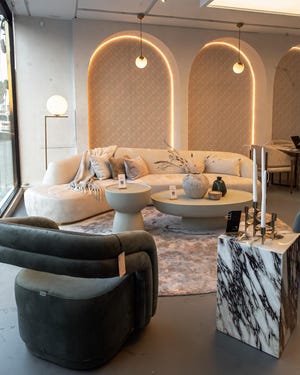
Almost every business in the modern economy faces the tension between brick-and-mortar and e-commerce. The luxury furniture industry is no different.
Traditional brick-and-mortar stores have historically been the cornerstone of the luxury furniture industry. These physical showrooms offer customers a tactile and immersive experience, allowing them to touch, feel, and assess the quality of luxurious materials and craftsmanship. Customers often value the personalized service and expertise associated with these upscale retail environments. Unfortunately, these stores have high overhead costs, including rent, utilities, and staff salaries. As consumer preferences change, however, becoming more and more comfortable purchasing everything online, the traditional model is being challenged.
The rise of online shopping has introduced new opportunities and challenges to the luxury furniture market. E-commerce platforms have enabled furniture brands to expand their reach globally and connect with a wider audience. From newcomers like Wayfair to online arms of traditional industry players like West Elm, online platforms are enabling customers to browse, compare, and purchase furniture from the comfort of their homes.
Rove Concepts is a modern furniture brand marrying high-quality luxury furniture, modern e-commerce convenience, and various innovative digital tools, with traditional brick-and-mortar showrooms. Rove is more than just a furniture brand, it is a lifestyle movement that curates how people feel at their most intimate and personal moments at home through physicality.
Over ten years ago, Art Lee founded Rove Concepts as all great entrepreneurs do, by solving a problem he encountered in his own life. Lee quickly saw a massive gap in the market when looking to purchase furniture for his own apartment. Generally speaking, the industry leans towards two extremes: expensive luxury furniture or cheap furniture with dubious durability. Simply put, Lee couldn’t find furniture in the “Goldilocks zone” — something that looked sleek and wouldn’t break the bank, or after a year — so he set out to make them. Lee, who comes from an e-commerce tech background, found it natural to launch a direct-to-consumer digital native furniture company to solve this gap.

Lee’s value proposition was quickly confirmed as the business has grown steadily since its inception. With a low-overhead e-commerce model compared to traditional competitors, Lee was able to focus on design and provide premium yet cost-friendly furniture to a rapidly growing customer base. With this newfound success, Lee and the Rove Concepts team started to expand into every category of the home, from dining to bedroom to living to office to outdoors.
Thanks to Rove’s in-house design team and cost philosophy, the company has grown with every new iteration and product line. Rove found product-market fit and effectively differentiated itself in the outdoor furniture market with its brand philosophy, growing the segment to one of its largest revenue drivers in only two to three years. When Rove opened its office furniture line during the pandemic and the work-from-home boom, it was no different. Consumers quickly flocked to Rove for the luxurious yet affordable furniture they’ve come to expect. Even with the return to office movement, Rove’s office line is as popular as ever.
Rove Concepts prides itself on its selective curation taste. Rove Concepts is not a mass catalog as they curate and design intentionally emphasizing quality over quantity.
Lee and the Rove team are always looking for new ways to leverage innovative technology to better provide for their customers. To this point, Rove is an industry leader in exciting AR/VR visualization technology. Lee notes the consumer-facing devices have not yet caught up with Rove’s advanced capabilities. Lee understands that this technology is the future, so he is continuing to invest in the software as the hardware comes up to par. Additionally, Rove has an exclusive trade program where customers can get unparalleled service from Rove’s dedicated trade team for residential and commercial projects.
With this design approach, low-overhead online infrastructure, and value-add ethos, Lee democratizes access to premium and luxury furniture. Traditional brands that start with showrooms would need close to 50 years to build up what Lee and the Rove Concepts team have been able to build in 10 years through technology and an uncompromising design taste.

Despite this strategy, Lee is by no means against brick-and-mortar showrooms. On the contrary. Rove Concepts recently celebrated the grand opening of their new Melrose Showroom in Los Angeles, which also commemorated the 2-year anniversary of the Maria Collection. The international tennis superstar Maria Sharapova was in attendance for the engaging activation this past September. The new Melrose Showroom is a welcome addition to Rove’s roster of other showrooms based in Santa Fe Springs, Vancouver, and Toronto. Lee and the Rove team plan to open new showrooms in Soho, NYC, La Jolla, San Diego, and Bellevue, Seattle in the near future
